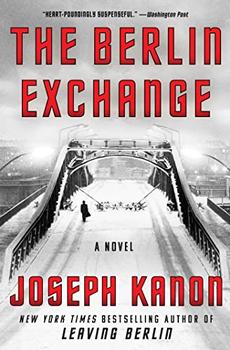Summary | Excerpt | Reading Guide | Reviews | Beyond the Book | Readalikes | Genres & Themes | Author Bio

A Novel
by Joseph Kanon
"Like what?"
"The way you want someone to look at you. Like a hunger. And I thought—if we're telling the truth—maybe with him. But I had to know first. If we fit. You see, I don't lie to you. I wouldn't say this if we didn't fit."
He was quiet for a second. "But we do."
"Yes," she said, crushing out the cigarette and looking at him. "It's a good fit. And once that's right, you always have it."
And they did, again that night and for years after. They always had the sex. Even after things changed, after they became different people, they had the sex. One of their secrets. Sometimes, in prison, he wondered if he had done it for sex, had been that much of a fool. But it hadn't felt that way at the time. Something the Party needed, the world, if it was to have peace. Serious reasons. He hadn't done it for her, the spying. But he wouldn't have done it alone.
Now he was riding down Friedrichstrasse with her husband. How did they fit? he wondered. Don't. Past the station, turning onto Unter den Linden, the imperial route. But the street looked more run-down than the ones by the Charité, the old Schinkel buildings sooty and damaged, what they must have looked like right after the war. Down toward the Gendarmenmarkt you could still see heaps of rubble that no one had bothered to cart away.
"The Schloss is gone," Martin said, seeing the empty space where the palace had been. Across from it, the Dom was streaked with black char.
"Yes, a long time now. It was dangerous, not worth saving."
"A shame, though."
"Well, perhaps. But a bad symbol. There was so much to do after the war. And no money. What do you do? Save the past, patch it up? Or build the future. A socialist society—we had to look ahead. Wait till you see what they've done in Alexanderplatz."
The station looked the same, but everything else, the maze of small streets that had fed off it with their pickpockets and lottery sellers and whores, the usual station riffraff, had been razed, paved over, and turned into a shapeless open plaza surrounded by glass high-rises, a cheap version of West Berlin.
"You see there? They're building a radio tower. The tallest in the world. Much higher than the Funkturm." A point of pride, winning some invisible race. "For television too. You know that Peter is on the television?"
"No." Or anything else about him. What he smelled like as an infant. The look of him in Sabine's arms. How it felt, seeing him. Then not seeing him.
"Yes. Die Familie Schmidt. A program on the DFF. He plays the son. At first, a small part. Sabine arranged it. You know, she has friends in the theater. Now television. The work is there. So why not use Peter? A little extra money. And you know, she's drawn to that life. So maybe it's for her a little too. And then what happens? People like him. The funny one. But a good boy. So more lines. Now he's well-known. One of the Publikumslieblinge."
Martin looked at him, unfamiliar with the expression. "Public darlings?"
"Yes, audience favorites. Not necessarily the star part, but people look forward to seeing you."
Martin sat back. East German television. What could that possibly be like? Something else he didn't know.
"How long has he been doing this?"
"Two years. Of course, the way he's growing now, he may grow out of the part soon." The proud father.
"Why don't they just let him get older, if he's such a favorite?"
"No, he needs to be a child. That's the point, you understand. A family show. Peter does something he shouldn't, some mischief, and then his father teaches him a lesson. How a good socialist behaves. It wouldn't work if he were older."
Is that what you do? Martin wondered. Teach good socialist lessons?
"And does he enjoy it? Acting?"
"Well, but he's not a professional. Sabine coaches him, but the reason it's good is that he's so natural, a real boy. That's my theory anyway. Of course he likes having the car, things like that."
Excerpted from The Berlin Exchange by Joseph Kanon. Copyright © 2022 by Joseph Kanon. Excerpted by permission of Scribner. All rights reserved. No part of this excerpt may be reproduced or reprinted without permission in writing from the publisher.
Your guide toexceptional books
BookBrowse seeks out and recommends the best in contemporary fiction and nonfiction—books that not only engage and entertain but also deepen our understanding of ourselves and the world around us.